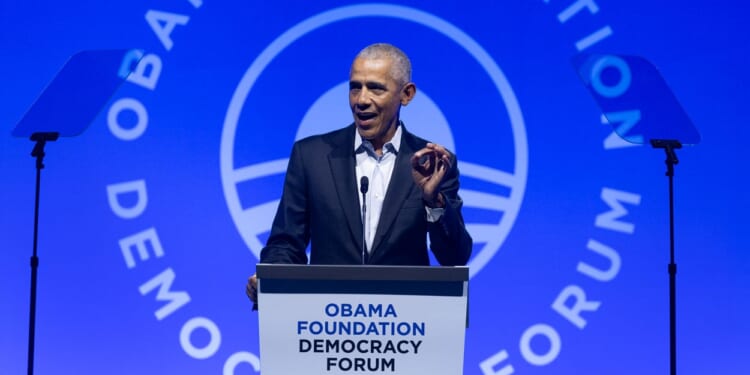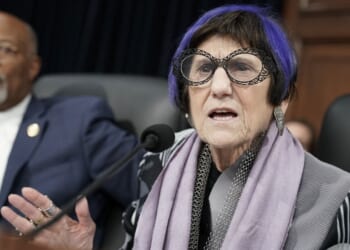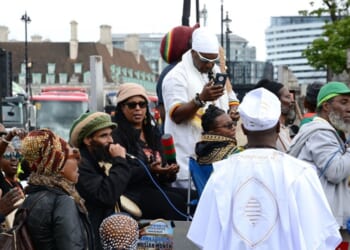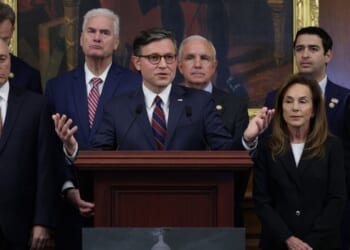Former President Barack Obama thinks nothing of trying to interfere in the internal politics of democratic U.S. allies in Europe, and in the process, thwarting his country’s own current foreign policy, as determined by his elected successor, President Donald Trump.
All in the name of democracy, of course.
And he can do all this because he has built a very well-endowed foundation into which billionaires pour funds and which he uses to train future leaders to transform the world along Obama’s vision—pretty much the way he promised to transform the United States, and some say, sadly, he did.
The 44th president justifies all this because he describes his opponents as “authoritarian”—something he may really believe—and he poses himself as the redeemer. The savior role is one Obama played with gusto on the world’s largest stage for eight years, so we shouldn’t be surprised.
Still, stepping back and considering the cheek—he would call it “audacity”—takes one’s breath away.
Two U.S. allies Obama is currently picking on are Hungary and Poland, which have pro-American populations with living memories of America’s unstinting support during the hard decades of Soviet despotism. More importantly—or worse yet, when it comes to Obama—these nations by and large eschew race and sexual theories, climate alarmism, mass immigration, and anti-Israeli fanaticism.
Hungary has been led by Prime Minister Viktor Orban since 2010, and Poland just elected Karol Nawrocki as president. Both are conservative figures who support the U.S. government.
The platform Obama uses is his Obama Foundation, a Chicago-based nonprofit organization that has assets of nearly $1 billion, and in 2024 raised nearly $200 million. It’s like the U.S. Agency for International Development never went away.
Since its creation in 2018, the foundation has run several programs, including the Obama Foundation Scholars, which handpicks about 30 possible leaders from around the world every year and puts them through some sort of Obama boot camp for an academic year.
Then it unleashes them back into their countries for a lifetime of service to the Obama cause.
The training includes classes at Columbia University and workshops in Chicago “to build community, participate in skill-building workshops, and engage with local organizations advancing place-based change.” The scholars work on leadership skills, are indoctrinated by the foundation, develop “action plans,” and learn to network with alumni and other Obamaworld luminaries.
They also get an executive coach and are trained in strategic communications and fundraising, “to aid scholars in their action plan development.”
In 2022, the foundation received a strong bump in revenue from $159,322,544 to $308,860,345. The primary reason for this sudden increase in funding was a generous gift of $100 million from Airbnb CEO Brian Chesky to fund a new scholarship program.
The Voyage Scholarship created a two-year leadership program. It allows college students to receive up to $50,000 in financial aid for college, a $10,000 travel stipend, and $2,000 every year for 10 years (after college) to travel around the world.
In 2021, Jeff Bezos donated around $100 million. This donation was intended to build the foundation’s new complex in Chicago.
This is how you build a global cadre. And Obama isn’t shy about putting his special corps to work, as seen in a highly produced video the foundation just put out.
In it, we see him meeting in London with three members of the Obama Foundation’s alumni network—Sandor Lederer and Stefania Kapronczay from Hungary, and Zuzanna Rudzinska-Bluszcz, who was deputy justice minister in Poland from December 2023 to August of this year—for a chat on how to do neighborhood organizing, just on a global level. CNN says the meeting was last month.
The reason he picked those countries? They’re “on the leading edge of confronting autocracy,” he tells us. “I’ve become increasingly concerned about the rising wave of authoritarianism sweeping the globe.”
He greets his guests, saying, “All three of you have been fighting the good fight and rising up in the face of significant challenges to try to strengthen democracy. You’re setting an example for all of us in the United States, here in the U.K.”
Kapronczay, a “human rights defender” in Hungary, avers that “authoritarians came to power” because “democracy was not working.” Electorates, you see, vote in leaders like Trump, Nawrocki, and Orban, because “people are really, in general, disappointed in democracy.”
Obama kind of agrees. The liberal, democratic market-based order that dominated the West after World War II ran aground because the governments, “whether center right or center left, were losing touch with people and weren’t delivering on some of the basic hopes and dreams of people.” That’s actually true, but then comes Obama’s spin—“that obviously then opens the door for right-wing populism, anti-government sentiment, anger, grievances.”
The responses he heard must have pleased the old community organizer from Chicago: Hungarians and Poles on the Left need to start working the grassroots at the local level, where they can “nurture a new generation of decision-makers,” according to Lederer.
Kapronczay agrees: “Democracy is very much about this local level,” about “these micro-skills of cooperation, of reaching across the divide. … This is where we should really focus our attention. Participatory programs. Participatory budgets.”
Obama asked what more his foundation could do. But Orban is locked in a tight fight with a new opposition leader for elections in April. What are the chances this U.S. ally will not appreciate interference at this level from a former president?
Originally published by the Washington Examiner















